 Move Welcome
Move Welcome
Open Welcome
Welcome To AssetCenter!
Try AssetCenter today with a free account. We offer a free no credit card required account to try us out.
AssetCenter gives you instant visibility into your organization. Start by creating asset and subscription categories, then add your assets, subscriptions, locations, and people. Want to move faster? Use our Excel import templates to bulk-import your data and be up and running in minutes.
Use this user manual as your reference guide as you navigate the app.
Lets get started with the sign up process.
Welcome
88 words
 Move Create an Account
Move Create an Account
Open Create an Account
Create an Account
Create you free account here at our register page.
Sign up on the page with your name, organization name, email address and password.
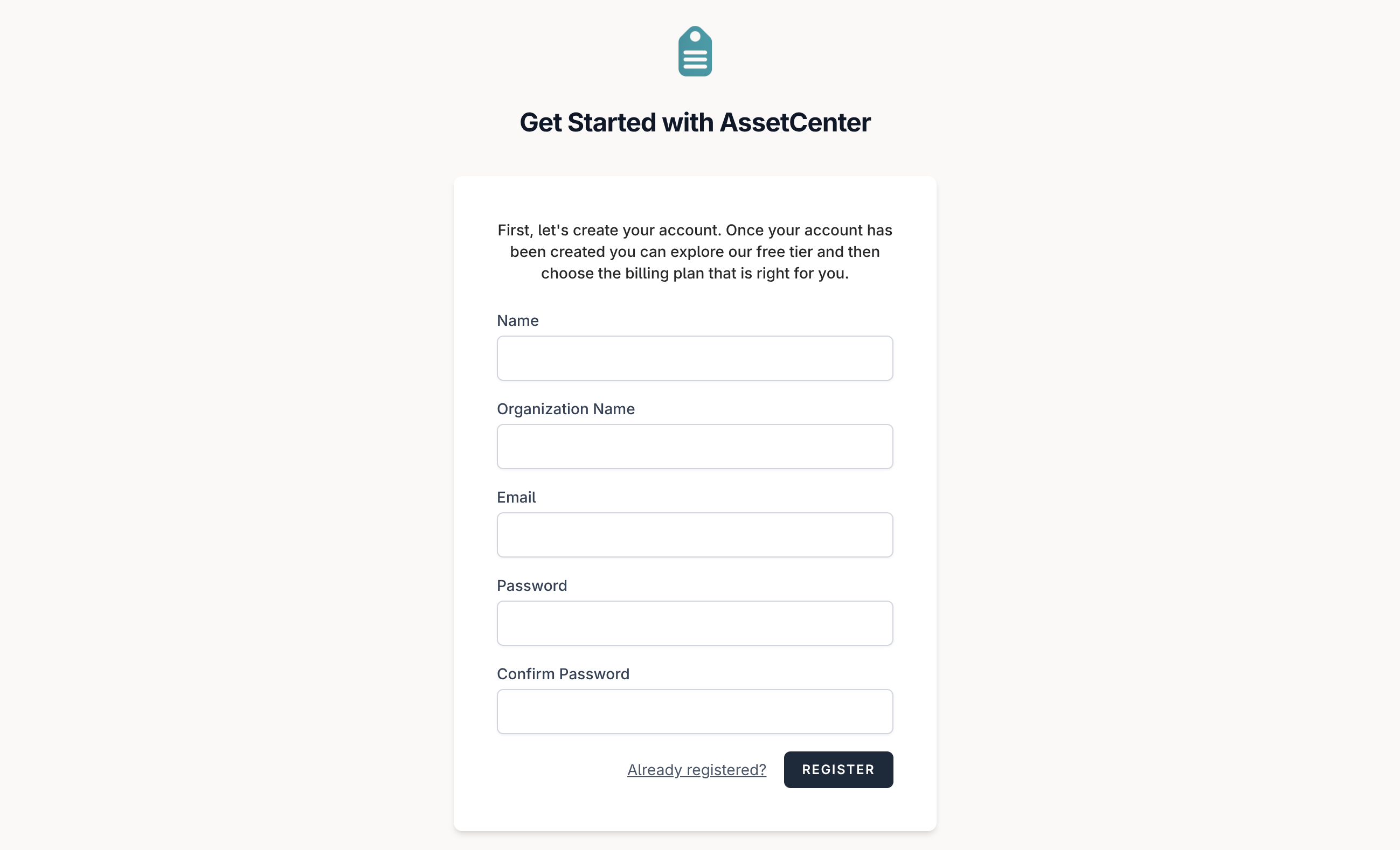
Once you hit register you will be signed in to the home dashboard.
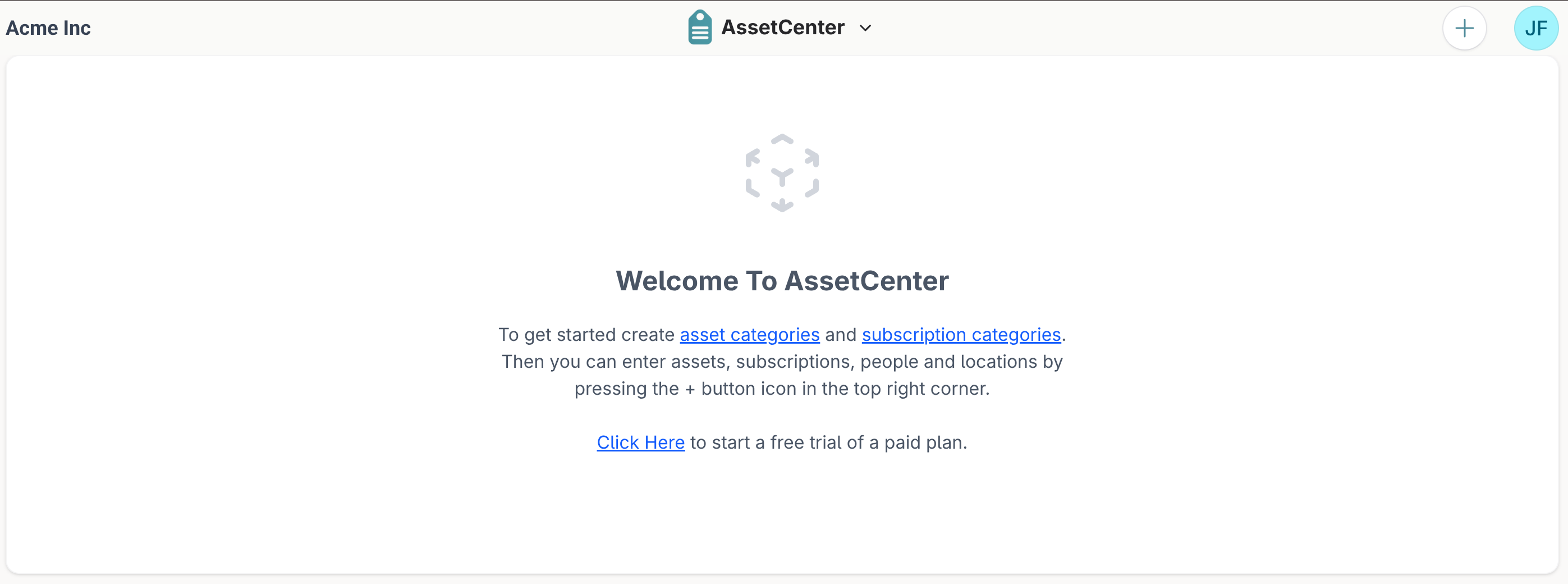
From here you can create custom categories for assets and subscriptions.
Then you will be all set to start entering your assets, subscriptions, people and location.
Your free account is free forever and it includes 25 assets, 10 subscriptions, 3 people, 1 location and 1 user account.
Create an Account
90 words
 Move The Plans
Move The Plans
Open The Plans
The Plans
AssetCenter offers flexible plan options from personal plans for home users to business plans to fully custom plans for the enterprise.
Every new account that signs up will start on the Personal Lite plan, it offers 25 assets, 10 subscriptions, 3 people and 1 location free forever no credit card required.
<t
| Plans | Personal | Personal Plus |
Starter |
Growth |
Professional |
|---|
| Cost | $5 / Month | $10 / Month |
$50 / Month |
$150 / Month |
$300 / Month |
| Assets | 50 | 100 |
500 |
2000 |
5000 |
| Subscriptions | 20 | 30 |
250 |
1000 |
3000 |
| People | 5 | 10 |
100 |
250 |
500 |
| Locations | 5 |
The Plans
200 words
 Move The Main Menu
Move The Main Menu
Open The Main Menu
The Main Menu
AssetCenter uses a unified menu to navigate the app. The AssetCenter logo in the top middle of the navigation opens the main menu. There is also a shortcut keyboard command. Ctrl/Command + K will open the menu.
The top search box is for quickly navigating to an asset, subscription, person or location. Just start typing and it will populate with the search results.
The Dashboard through To-do button are the main pages and can also be navigated to using the keyboard shortcut Ctrl/Commant + 1-6.
These reports turn your data into insight. Explore how assets, subscriptions, and costs move across your organization and export any report to Excel for deeper analysis or sharing.
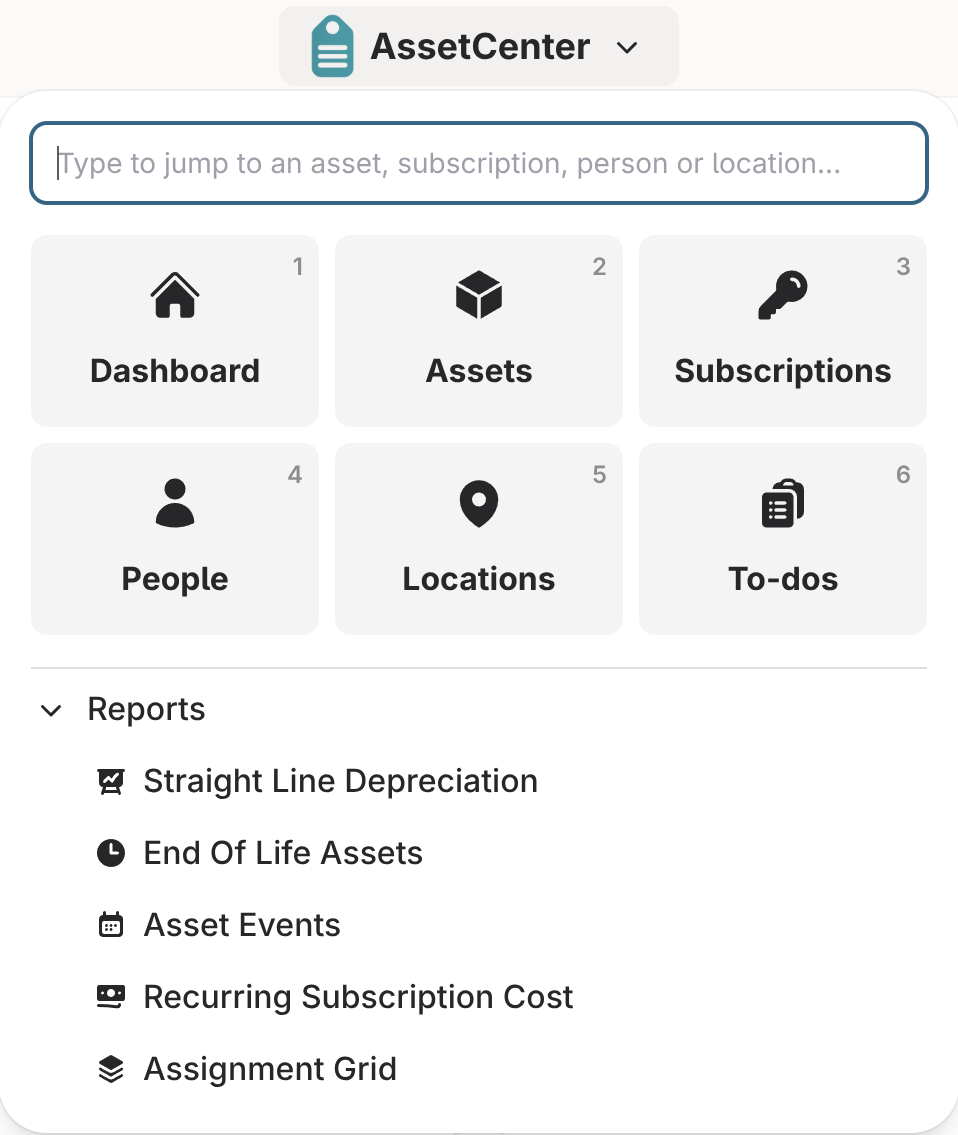
The Main Menu
118 words
 Move Custom Categories
Move Custom Categories
Open Custom Categories
Custom Categories
Custom categories need to created first before you can enter assets or subscriptions.
To get started creating your custom categories, click on your user avatar in the top right corner and select either asset categories or subscription categories.
Now that you are at the category settings page press the Add Category button to create a category.

New Category
Start by naming your category, and if needed give it a description. The category description only lives in the settings page but can be useful to help your team understand the purpose of a given category.

Report Settings
If this is an Asset Category then Report settings is the next section.
End Of Life
The End of Life field is used to decide when asset
Custom Categories
317 words
 Move Custom Category Fields
Move Custom Category Fields
Open Custom Category Fields
Custom Category Fields
Categories support custom fields so you can extend the asset or subscription to hold more details. For example maybe a category is a fleet of vehicles and you want to create a new field to hold odometer readings. Or you have a subscription for internet service providers and you need a field to hold the account pin code.
You can create as many fields as you want for a category. The field types that you can create are text field, number, date, checkbox, Yes/No/NA slider, and phone number. You can also mark if these fields are required so every new asset or subscription will require you to enter data in that field.
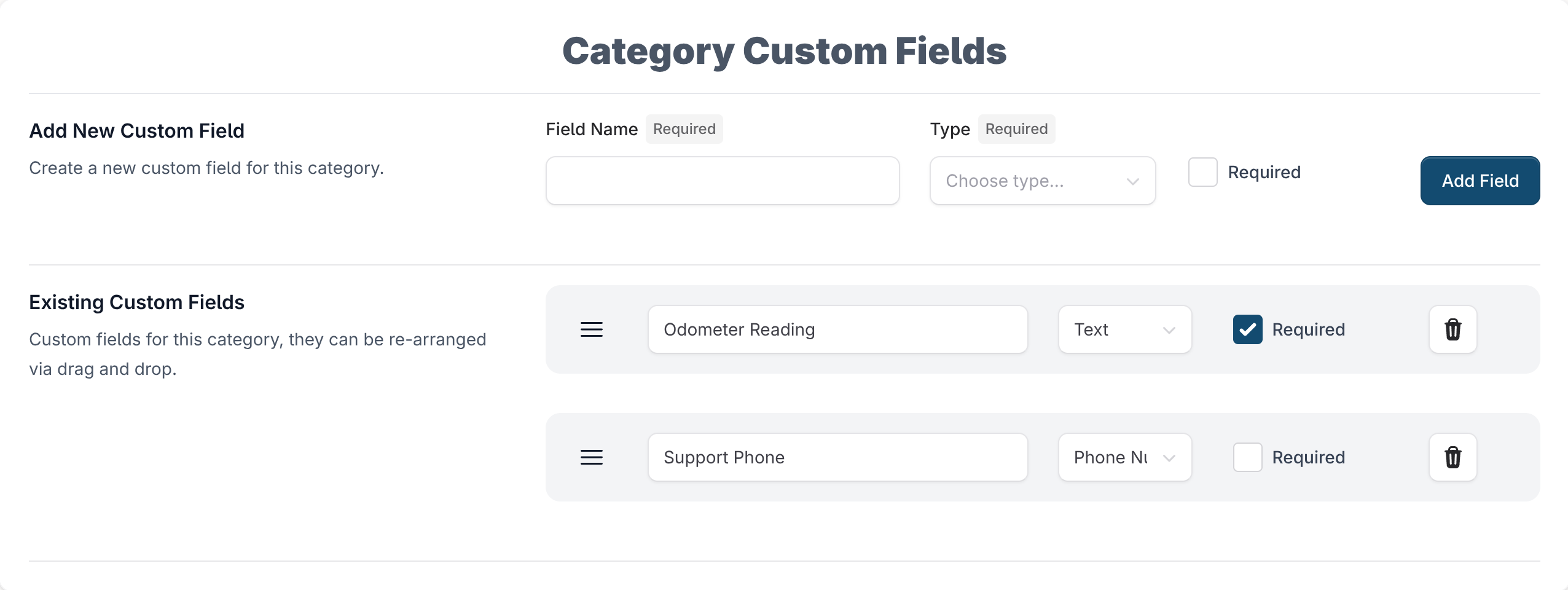
Custom Category Fields
117 words
 Move The Dashboard
Move The Dashboard
Open The Dashboard
The Dashboard
The dashboard is the main home page. It provides a centralized, real-time view of your organization’s assets, subscriptions, people, and locations.
The dashboard can be customized by pressing the customize button. This will allow you to re-order the cards on the page as well as hide the ones you do not want to see. The customization will be saved to your user profile for that organization and will persist until changed again.
Top Cards Key Metrics At A Glance
At the top of the dashboard, summary cards display high-level counts for:
- Deployed vs Available Assets – A snapshot of how many assets are currently assigned compared to those in inventory.
- Deployed vs Available Subscriptions – Visibility into active licenses versus unused or available subscriptions.
- Active People – The number of people currently tracked in the system.
- Active Locations – The number of locations managing or housing assets.
The hamburger buttons on the assets and subscriptions cards will all
The Dashboard
440 words
 Move Mobile App
Move Mobile App
Open Mobile App
Mobile App
AssetCenter does not yet have a mobile app that you can install from the app store. However you still have the ability to install AssetCenter on your phone or tablet using a method called PWA mode (Progressive Web App).
To install AssetCenter go to the site and login.
iPhone Install Directions
To install on an iPhone press the ... menu in the bottom right corner of Safari.
Select the first option Share, then scroll down to the + Add To Home Screen button. Finally press the Add button to add the icon to your home screen.
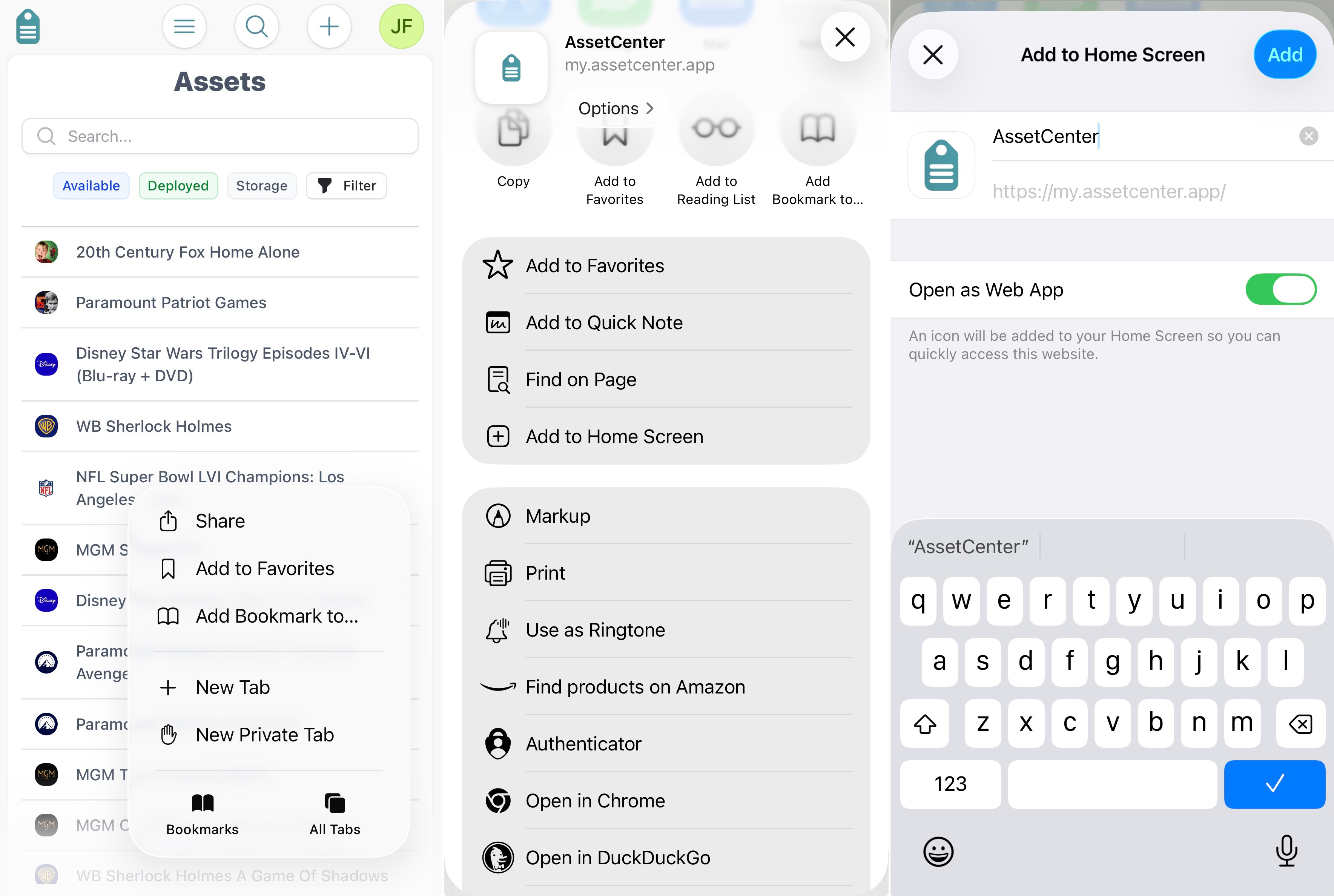
Mobile App
101 words
 Move Tips and Tricks
Move Tips and Tricks
Open Tips and Tricks
Tips & Tricks
Keyboard Shortcut to the Main Menu is Command + K on Mac and Control + K on Windows
To quickly enter today's date on any date field, click on the date field and press the letter t on the keyboard.
All of the main pages have keyboard shortcuts.
- Dashboard page is Ctrl/Command + 1
- Assets page is Ctrl/Command + 2
- Subscriptions page is Ctrl/Command + 3
- People page is Ctrl/Command + 4
- Locations page is Ctrl/Command + 5
- To-dos page is Ctrl/Command + 6
Tips and Tricks
94 words
 Move Assets
Move Assets
Open Assets
Adding Assets
To add assets, subscriptions, locations, or people you always will press the round + button in the top right hand corner. In the menu that pops up, select Asset.
Asset Details
To add an optional image of your asset select the Choose File button in the image section.
Next it is required you select a category. If you have not setup any categories yet, go to the custom categories page to learn how to setup categories.
Fill out the rest of your asset details, the name column is the only other required field in this section. If you want to record the condition of your asset select the appropriate option from the Asset Condition dropdown.
Asset Acquisition
The acquisition section is where you record details about how you got the asset. First enter the type was it purchased, gifted, leased, etc. Then you can fill out the fields for that acquisition type.
The salvage value is used for calculating
Assets
335 words
 Move Subscriptions
Move Subscriptions
Open Subscriptions
Adding Subscriptions
To add assets, subscriptions, locations, or people you always will press the round + button in the top right hand corner. In the menu that pops up, select Subscription.
Subscription Details
First select a required category. If you have not setup any categories yet, go to the custom categories page to learn how to setup categories.
Fill out the rest of your subscription details, the name column is the only other required field in this section.
Next choose your billing type, this is required and will open up more columns to fill out based on the type. Your options are Subscription, Lifetime Purchase, and Free.
If this subscription is a recurring subscription charge select Subscription, if this subscription is a one time upfront purchase select Lifetime Purchase and if this subscription is free select the free option.
Subscription
A subscription billing type will open up Billing Detai
Subscriptions
278 words
 Move People
Move People
Open People
Adding People
To add assets, subscriptions, locations, or people you always will press the round + button in the top right hand corner. In the menu that pops up, select Person.
Person Details
To add an optional image of the person select the Choose File button in the image section.
Next fill out the details section, the first and last name fields are required.
If this person does not belong to your organization you can select the external person checkbox. A new field will appear allowing you to enter the name of that persons organization. On that persons profile they will have a badge marking them as an external person.
People
112 words
 Move Locations
Move Locations
Open Locations
Adding Locations
To add assets, subscriptions, locations, or people you always will press the round + button in the top right hand corner. In the menu that pops up, select Location.
Location Details
To add an optional image of the location select the Choose File button in the image section.
Next fill out the details section, the name field is required.
The Type field is designed to designate what type of location this is, a headquarters, yard, home, remote office, etc.
The temporary checkbox is used when this location has an end date. When the temporary box is checked a location end date field will appear so you can enter an end date.
Locations
115 words
 Move Assets
Move Assets
Open Assets
Managing Assets
Overview
The Overview section provides complete details of the asset.
The first row displays key identifiers and status information, including the asset’s category, asset tag, condition, ownership duration, and current status.
The second row highlights the asset name.
The third row includes the remaining asset details along with any custom fields specific to the asset’s category.
The fourth row summarizes all cost-related information, including the purchase price, warranty cost, and any repair or maintenance expenses associated with the asset.

Current Assignments
The current assignments section has a toggle, first is the currently assigned person and or location. Then press the toggle to see assigned subscriptions to the asset
Along with the name, this section will also include a badge indicating how long it has been since the assignm
Assets
553 words
 Move Subscriptions
Move Subscriptions
Open Subscriptions
Managing Subscriptions
Overview
The Overview section provides complete details of the subscription.
The first row displays the category and the status.
The second row highlights the subscription name.
The third row displays the type of subscription and the cost.
Current Assignments
The current assignment section lets you toggle between the people, location and asset assignments on this subscription.
Along with the name, this section will also include a badge indicating how long it has been since the assignment was made.

Timeline
The timeline documents the complete lifecycle of each subscription from purchase through billing updates, to-dos, contracts, assignments and notes. Every activity is recorded in one place, and each timeline entry can be edited with a single click.
Comments and attachments are supported on all timeline entries
Subscriptions
393 words
 Move People
Move People
Open People
Managing People
Overview
The Overview section provides complete details of the person.
The first row displays title, department and status.
The second row highlights the persons name.
The third row displays address, email, phone number and organization.
The fourth row displays costs associated with the person.

Current Assignments
The current assignment section lets you toggle between the assets, subscriptions and locations assigned to this person.
Along with the name, this section will also include a badge indicating how long it has been since the assignment was made.

Timeline
The timeline documents everything that has been associated with this person. Every asset, subscription, and location. Including events this pe
People
391 words
 Move Locations
Move Locations
Open Locations
Managing Locations
Overview
The Overview section provides complete details of the location.
The first row displays the type and status.
The second row highlights the locations name.
The third row displays address.

Current Assignments
The current assignment section lets you toggle between the assets, subscriptions and people assigned to this location.
Along with the name, this section will also include a badge indicating how long it has been since the assignment was made.

Spaces
If you add spaces to the location in the actions button, the Spaces section will appear below the current assignments. Spaces are essentially sub locations inside a location. They can be anything from a room, to a space, to a floor or anything el
Locations
444 words
 Move Organization
Move Organization
Open Organization
Organization
The organization settings page is where you manage this organization. AssetCenter is designed to support multiple organizations associated with your email address.
Multiple organizations are useful if you use the same email address for multiple companies in the case you are a consultant. Or in the case of large companies you may use different organizations for departments in your company. For example the IT department has an organization and the vehicle department has another organization.
Current Organization
The current organization card allows you to add a logo to your organization, change its name, delete the organization and create a new organization.
Organization can only be deleted if they do not have an active subscription, if you currently have a subscription you will need to first cancel and then you will be able to delete your organization. WARNING this can not be undone.
Login
The login card allows you to change the authentication method you use to login t
Organization
280 words
 Move Users
Move Users
Open Users
Users
The users settings page is how you manage all of the users in this organization. You can also invite new users to be part of your organization.
Clicking on the edit button next to any user will open a window where you can manage that user.
You have the ability to add an avatar image, change their name, change their avatar color and phone number.
This window also provides security options. You have the ability to choose if they are an admin or a user.
Other options in this window are timezone. Send a password reset and require the user to have 2 factor authentication.
Security
Admins:
Users:
- Can be restricted to specific asset or subscription categories
- Can only edit their own user.
- Read only access to the Plan & Billing page
- All other settings pages hidden
Users
150 words
 Move Plan & Billing
Move Plan & Billing
Open Plan & Billing
Plan and Billing
The plan and Billing settings page is where you manage your subscription to AssetCenter.
It will tell you which plan you are currently on and give you a readout of how many resources you are using and how many are provided in your current plan.
There is a button to change your plan.
Finally any invoices that have been generated will be listed in the Invoices card as PDF's you can download.
Plan & Billing
76 words
 Move Imports
Move Imports
Open Imports
Imports
The imports settings page is where you can bulk import resources into AssetCenter. This can be done anytime, this is not just for when you first get started with us. For example if you purchase 20 F-150 pickups, the Imports page is a great way to quickly get them uploaded into the system.
The imports page has 4 tabs, Assets, Subscriptions, Locations and People. Each resource type is uploaded separately. We provide Excel import templates for you to add your resources to and then upload them to this page.
You can download the templates from this page there is a link at the top.
Importing
Importing is a 3 set process. First you upload the completed excel template file into the Step 1 Uploader.
Then in step 2 press the Validate Import button to look for any errors in the excel file. If any issues are found they will be listed below telling you which row in the spreadsheet had a problem and what the problem is.
If no errors are found you can proceed to step 3 Import the Assets. Pr
Imports
304 words
 Move Asset Categories
Move Asset Categories
Open Asset Categories
Asset Categories
The asset categories settings page is the first step to get AssetCenter setup. Before any Assets can be setup in the system you first need to create categories.
AssetCenter out of the box does not include any categories. This is by design so that you can tailor it to your specific use case and industry. If you are using it for IT you will setup Laptops, Desktops, Phones as categories. If you are using this for a fleet of vehicles you may use Cars, Light Trucks, SUV's are categories. Its fully flexible to however you plan to use the system.
For detailed instructions on how to setup a category visit the Custom Categories page
Asset Categories
117 words
 Move Asset Conditions
Move Asset Conditions
Open Asset Conditions
Asset Conditions
The asset conditions setup page is designed for allowing you to have your own physical condition types. Out of the box AssetCenter comes with Excellent, Good, Fair, Poor and Broken. But you can customize these however you want and even add your own.
Asset Conditions
46 words
 Move Asset Custom Events
Move Asset Custom Events
Open Asset Custom Events
Asset Custom Events
The Asset Custom Events settings page allows you to create your own event types for Assets. In the Event window on assets out of the box we include, Accidental Damage, Broken, Lost, Recycled, Retired, Sold, Stolen and Vandalism.
There may be other events that you want to be able to do on your assets. In this page you can create those custom events. You can name your event, assign it a color and and icon. You can even toggle if this event has a cost or responsible person associated with it.
Asset Custom Events
95 words
 Move Subscription Categories
Move Subscription Categories
Open Subscription Categories
Subscription Categories
The subscription categories settings page is the first step to get AssetCenter setup. Before any Subscriptions can be setup in the system you first need to create categories.
AssetCenter out of the box does not include any categories. This is by design so that you can tailor it to your specific use case and industry. If you are using it for IT you will setup ISP's, and Software as categories. If you are using this for a fleet of vehicles you may use Infotainment System, Charging Network, Self Driving as categories. Its fully flexible to however you plan to use the system.
For detailed instructions on how to setup a category visit the Custom Categories page
Subscription Categories
119 words